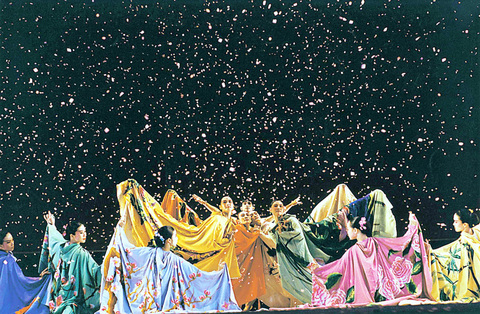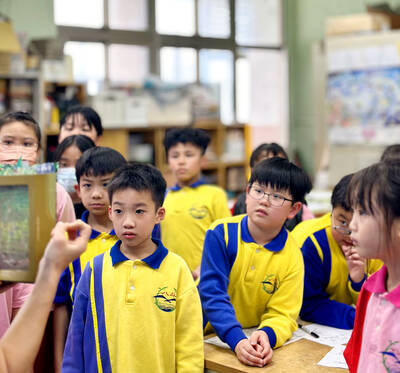From a table on the second floor of the studio, Lin Hwai-min (
The gracefully aging choreographer greeted me wearing nothing but a pair of white boxers, barked a few orders and scribbled some notes during the rehearsal.
"They're doing good today," he says with a proud smile. It's hard to disagree.

PHOTO COURTESY OF CLOUD GATE
There are plenty of beautiful dance performances to be seen in Taipei. What makes Dream so special is that there is nothing gratuitous about its beauty. And that's not a given for a two-hour-long interpretive dance based on a Chinese epic novel relying heavily on expensive sets and elaborate costumes.
Dream, like a lot of what Cloud Gate does, walks the fine line between boringly abstract and irritatingly pretty. The result is something that is both undeniably profound and instantly cool. Even the sexuality -- and there is sexuality -- is neither juvenile nor prudish. Not a lot of groups have the chops to pull this off, but at its worst Cloud Gate makes it look easy, and there are moments when it seems inevitable.
Lin insists -- and he's right -- that you don't need to know the story to appreciate the dance. "Dance is not there to tell any story," he said. "Dance is dance."
Still, Lin choreographed Dream in the first place because he was "crazy in love" with the novel, and his face lights up as he describes the story "about youth and youth lost."
The story is bookended by a red-robed monk reminiscing about his youth. The monk, as a young man living in a beautiful garden, falls in love with "the white lady." But he is forced to marry her rival, "the red lady," which drives his lover to her death and causes the man to leave the garden and become the monk.
Lin is unabashedly nostalgic about letting such a piece go. "It's really very beautiful," he remarks, a little sadly. But he insists that the performance in Shanghai later this year is "the absolute last -- finito."
"I'm being pulled into this hectic schedule," he says, and Dream is simply too complicated to keep in the repertoire. As to what he'll be doing instead, Lin says he may choreograph "something in Europe" soon, refusing to elaborate except to giggle and say, "It's wild."
Although tomorrow's performance will take place outdoors at the National Taiwan Concert Hall Plaza, 21-1, Zhongshan S Road (
The show starts at 7:30pm, but Lin says that if you want a front-row seat you need to be at least three hours early. As for the venue, it should be easy to find: Go to CKS Memorial Hall Station on the red line and follow the crowd.
As for Cloud Gate's next piece, Cursive III, which will debut later this year, it is in a style entirely different from Dream, but should be very cool. Lin says he's put off completing the trilogy to give his dancers time to mature, and now they're ready for a more frenetic piece. "We're working like crazy," he says. "It's really wild."

May 26 to June 1 When the Qing Dynasty first took control over many parts of Taiwan in 1684, it roughly continued the Kingdom of Tungning’s administrative borders (see below), setting up one prefecture and three counties. The actual area of control covered today’s Chiayi, Tainan and Kaohsiung. The administrative center was in Taiwan Prefecture, in today’s Tainan. But as Han settlement expanded and due to rebellions and other international incidents, the administrative units became more complex. By the time Taiwan became a province of the Qing in 1887, there were three prefectures, eleven counties, three subprefectures and one directly-administered prefecture, with

It’s an enormous dome of colorful glass, something between the Sistine Chapel and a Marc Chagall fresco. And yet, it’s just a subway station. Formosa Boulevard is the heart of Kaohsiung’s mass transit system. In metro terms, it’s modest: the only transfer station in a network with just two lines. But it’s a landmark nonetheless: a civic space that serves as much more than a point of transit. On a hot Sunday, the corridors and vast halls are filled with a market selling everything from second-hand clothes to toys and house decorations. It’s just one of the many events the station hosts,

Two moves show Taichung Mayor Lu Shiow-yen (盧秀燕) is gunning for Chinese Nationalist Party (KMT) party chair and the 2028 presidential election. Technically, these are not yet “officially” official, but by the rules of Taiwan politics, she is now on the dance floor. Earlier this month Lu confirmed in an interview in Japan’s Nikkei that she was considering running for KMT chair. This is not new news, but according to reports from her camp she previously was still considering the case for and against running. By choosing a respected, international news outlet, she declared it to the world. While the outside world

Through art and storytelling, La Benida Hui empowers children to become environmental heroes, using everything from SpongeBob to microorganisms to reimagine their relationship with nature. “I tell the students that they have superpowers. It needs to be emphasized that their choices can make a difference,” says Hui, an environmental artist and education specialist. For her second year as Badou Elementary’s artist in residence, Hui leads creative lessons on environmental protection, where students reflect on their relationship with nature and transform beach waste into artworks. Standing in lush green hills overlooking the ocean with land extending into the intertidal zone, the school in Keelung